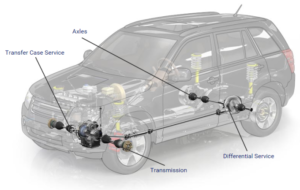When your transmission starts to fail, you may want to get your vehicle fixed by a professional. While you may be tempted to do it yourself, it’s always better to trust the experts like Capistrano Transmission & Auto Repair. Learn about their experience, their responsibilities, and how much they charge. Choosing the right auto repair shop is crucial for maintaining your vehicle’s value and reliability.

Transmission repairs are important to the health of a vehicle’s engine. While it’s often a relatively simple process, there are signs to look for to alert you to a problem. Some symptoms include strange engine noises, difficulty shifting gears, or gear slippage. These signs should prompt you to have the transmission checked out by a qualified mechanic.
Transmission fluid can become dirty and lose its lubricating properties, which is why it’s essential to regularly replace your transmission fluid. This prevents your vehicle from experiencing a range of transmission problems that can be expensive and time-consuming. Checking for leaks or grinding sounds while shifting gears can also help you avoid more costly repairs.
Regular maintenance will help your vehicle last longer. Not only will it prevent costly major auto repairs, but it will also help preserve your warranty. Your car’s owner’s manual will indicate the appropriate service interval for your vehicle. Depending on the mileage on your vehicle, this could range anywhere from 30,000 to 150,000 miles. During this service, the automaker will check fluid filters, vital fluids, and more.
Transmissions are complex systems that need to be maintained regularly to avoid expensive repairs. Regular transmission fluid changes will prevent unnecessary wear and tear on the gears and prevent transmission failure.
If you notice your transmission is making odd noises or slipping gears, you should make an appointment with your mechanic. Transmission problems can be difficult to diagnose because they can be easily confused with other car issues. In some cases, transmission problems are caused by low transmission fluid or by the wrong type of transmission fluid. Warning lights are also a sign that your transmission needs to be repaired.
If your transmission starts to smell like burnt rubber, you may have a leak or dirty fluid. Running a car with dirty transmission fluid is just as harmful as running it with old oil. You may also notice unusual noises, including humming or whining, in the transmission. These noises can be a sign of transmission problems and should be treated immediately.
Other symptoms of transmission failure include grinding, whining, and clunking. These noises can come from the transmission’s gears or from the engine. If you can identify the type of noise, your mechanic can determine the problem and fix it.
Transmission problems are costly. They can damage a vehicle, deteriorate fuel economy, and even cause it to stay neutral. But luckily, you can often fix the problem yourself for a reasonable cost. Transmission problems can be easily diagnosed. You can save anywhere from $75 to 125 dollars by performing the diagnostics yourself. If your car is having shifting problems, you may have a damaged shifter cable.
Depending on the condition and the type of transmission, a repair can cost anywhere from $100 to several thousand dollars. This is typically lower if you own a US domestic model. Imported cars tend to cost more. And a well-maintained car can also save you money. However, a rare car can be much harder to find parts for, so the cost can be significantly higher.
Another option is rebuilding the transmission. While this is more expensive, it is generally safer to replace the transmission, as the old components will start to fail after a few hundred thousand miles. Even if the car has a warranty, it can still be very expensive.
Transmissions are the most complex object in a vehicle, and their proper functioning is critical to the performance and reliability of the vehicle. They match the output of the engine to the vehicle’s speed and load conditions. A faulty transmission can cause the vehicle to shift gears slowly or even grind to a halt. Not only will this negatively affect your car’s performance, but it can also put you and other road users in danger. Fortunately, regular maintenance can greatly reduce your risk of transmission failure.